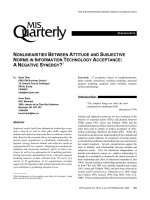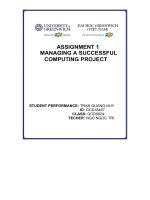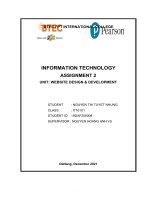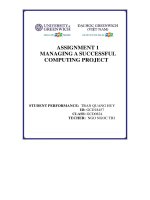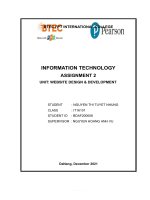information technology assignment 1 unit cloud computing
Bạn đang xem bản rút gọn của tài liệu. Xem và tải ngay bản đầy đủ của tài liệu tại đây (1.65 MB, 49 trang )
<span class="text_page_counter">Trang 1</span><div class="page_container" data-page="1">
<b> </b>
<b>BTEC FPT INTERNATIONAL COLLEGE </b>
<b>INFORMATION TECHNOLOGY ASSIGNMENT 1 </b>
<b> UNIT: Cloud computing </b>
<b>DaNang, July 2022 </b>
</div><span class="text_page_counter">Trang 3</span><div class="page_container" data-page="3">
ASSIGNMENT 1 FRONT SHEET
Qualification BTEC Level 4 HND Diploma in Business
Unit number and title
Unit: Cloud computing
NGUYEN THE XUAN LY
Student declaration
I certify that the assignment submission is entirely my own work and I fully understand the con- sequences of plagiarism. I understand that making a false declaration is a form of malpractice.
Student’s signature: BUI VAN ĐAT Grading grid
</div><span class="text_page_counter">Trang 4</span><div class="page_container" data-page="4">P1 P2 P3 P4 M1 M2 D1
</div><span class="text_page_counter">Trang 5</span><div class="page_container" data-page="5">
i
Summative Feedbacks: Resubmission Feedbacks:
Internal Verifier’s Comments:
Signature & Date:
</div><span class="text_page_counter">Trang 6</span><div class="page_container" data-page="6">CHAPTER 1 CLOUD COMPUTING SOLUTION ... 3
LO1 Demonstrate an understanding of the fundamentals of Cloud Computing and its architectures. ... 3
1 Analyse the evolution and fundamental concepts of Cloud Computing(P1). ... 3
Cloud computing is currently considered as one of the fastest growing fields in recent times. In this field of study, I will give a quick introduction to cloud computing. ... 3
1.1 The evolution of Could Computing ... 3
1.2 Definition of Cloud Computing ... 7
1.3 Cloud Service Models. ... 8
1.4 Some of the Top Cloud Services. ... 12
1.5 Cloud Deployment Models. ... 15
1.6 Benefit of cloud computing ... 18
1.7 The appropriateness solution ... 19
2 Design an appropriate architectural Cloud Computing framework for a given scenario(P2). ... 20
2.1 Deploying Wordpress on Windows server 2012 ... 20
2.2 Deploying WordPress on Ubuntu ... 24
2.3 Design cloud computing system of NTN.SHOP company ... 26
2.4 Architectural design ... 26
</div><span class="text_page_counter">Trang 7</span><div class="page_container" data-page="7">iii CHAPTER 2 Evaluate the deployment models, service models and technological drivers of Cloud
Computing and validate their use ... 30
LO2 Evaluate the deployment models, service models and technological drivers of Cloud Computing and validate their use. ... 30
3 Define an appropriate deployment model for a given scenario(P3). ... 30
3.1 Deployment model of Cloud Computing. ... 30
❖ Public Cloud . ... 30
❖ Private Cloud. ... 30
❖ Community cloud. ... 31
❖ Hybrid cloud ... 31
3.2 Compare deployment models ... 32
3.3 Deployment model for company MOD.SHOP. ... 34
4 Compare the service models for choosing an adequate model for a given scenario(P4). ... 35
4.1 Compare service models in cloud computing. ... 35
4.2 Choosing a service model for MOD.SHOP company. ... 38
4.3 Programming language, web server, database server. ... 38
</div><span class="text_page_counter">Trang 8</span><div class="page_container" data-page="8">iv
<b> </b>
<b>LIST OF TABLES AND FIGURES </b>
Figure 1 evolution of Could Computing ... 4
Figure 2 Cloud Computing ... 7
Figure 3 Cloud Service ... 9
Figure 4 Infrastructure as a Service ... 10
Figure 5 Platform as a Service (PaaS) ... 11
Figure 6 Software as a Service (SaaS) ... 12
Figure 7 mazon Web Services (AWS) ... 13
Figure 8 Microsoft Azure ... 14
Figure 9 Google Cloud Platform ... 15
Figure 10 Alibaba Cloud ... 15
Figure 11 Install IIS ... 21
Figure 12 Install Visual C ++ Redistributable cho Visual Studio 2015-2019 ... 21
Figure 13 Install PHP Manager for IIS ... 22
Figure 14 Install MySQL ... 22
Figure 15 Install phpMyadmin ... 23
Figure 16 Install WordPress ... 23
Figure 17 install WordPress successfully ... 24
Figure 18 Result configure WordPress ... 25
Figure 19 Cloud computing system of MOD.SHOP company ... 26
Figure 20 Network architecture diagram of MOD.SHOP company ... 27
Figure 21 MOD.SHOP Company Usecase Diagram ... 28
Figure 22 Customer use case ... 29
Figure 23 Cloud Service Models ... 37
</div><span class="text_page_counter">Trang 9</span><div class="page_container" data-page="9">v
</div><span class="text_page_counter">Trang 10</span><div class="page_container" data-page="10">
For service models, the company can consider using Software as a Service (SaaS) to manage their sales data, allowing them to access the information from anywhere and at any time. This can also help with real-time monitoring of inventory levels. Additionally, they can consider using Infrastructure as a Service (IaaS) for their database storage needs, allowing them to scale their storage as needed and benefit from the cost savings of not having to maintain their own hardware.
Overall, implementing cloud computing can help MOD.SHOP optimize its operations and make better use of its resources.
Cloud computing can definitely help MOD.SHOP streamline its business operations and improve efficiency.
For deployment models, the company can consider using a private cloud deployment, where they can have control over the infrastructure and maintain sensitive data within their own network. Alternatively, they can also consider a hybrid cloud deployment, where they can have a mix of private and public cloud services, allowing them to benefit from the cost savings and scalability of public clouds while still keeping sensitive data secure.
For service models, the company can consider using Software as a Service (SaaS) to manage their sales data, allowing them to access the information from anywhere and at any time. This can also help with real-time monitoring of inventory levels. Additionally, they can consider using Infrastructure as a Service (IaaS) for their
</div><span class="text_page_counter">Trang 11</span><div class="page_container" data-page="11">database storage needs, allowing them to scale their storage as needed and benefit from the cost savings of not having to maintain their own hardware.
Overall, implementing cloud computing can help MOD.SHOP optimize its operations and make better use of its resources.
</div><span class="text_page_counter">Trang 12</span><div class="page_container" data-page="12">
CHAPTER 1 CLOUD COMPUTING SOLUTION LO1 Demonstrate an understanding of the fundamentals of Cloud Computing and its
architectures.
1 Analyse the evolution and fundamental concepts of Cloud Computing(P1).
Cloud computing is currently considered as one of the fastest growing fields in recent times. In this field of study, I will give a quick introduction to cloud computing. 1.1 The evolution of Could Computing
Cloud computing has made it more convenient and flexible for users to access computer resources and store data remotely. Its ability to quickly set up and depreciate resources when needed also makes it a cost-effective solution for businesses as well as individuals. The widespread adoption of cloud computing has opened up new opportunities for innovation and growth in many industries.
With the birth of the social network Facebook in 2004, yahooo, Amazon e-commerce platform,... even more proved the importance of cloud computing for most fields related to the Internet. Users only need to register for an account and use the free and paid service according to their needs. They store documents on their "cloud" accounts and access them from any location as long as there is an internet connection..
</div><span class="text_page_counter">Trang 13</span><div class="page_container" data-page="13"><small>Figure 1 evolution of Could Computing </small>
❖
<b><sub>Distributed Systems: </sub></b>
In a distributed system, multiple computers work together to solve a problem, leveraging their combined processing power and memory resources to complete tasks more efficiently than a single computer could. By dividing a problem into smaller parts and distributing those parts across multiple computers, a distributed system can process large amounts of data and perform complex calculations much faster than a single computer could. Additionally, distributed systems often use techniques such as Remote Procedure Calls (RPCs) and Remote Method Invocation (RMI) to coordinate the work of the computers and ensure that the results of their computations are combined accurately.
❖
<b><sub>Mainframe computing: </sub></b>
Mainframe is a large and powerful computer system designed to process large amounts of data and perform complex calculations. Mainframes are often used by organizations to run mission-critical applications, such as large-scale transaction processing systems and databases. The large size, powerful processing power, and high-speed I/O system of the mainframe make it well-suited to handle large amounts of data and support multiple users concurrently. Additionally, mainframes often use specialized hardware and software to ensure high availability and reliability, making them a critical component of many organizations' IT infrastructure.
</div><span class="text_page_counter">Trang 14</span><div class="page_container" data-page="14">❖
<b><sub>Cluster computing: </sub></b>
Computer cluster is a group of interconnected computers that work together to perform computations as if they were a single system. By pooling the resources of multiple computers, a cluster can perform complex calculations and handle large amounts of data more efficiently than a single computer.Cluster computing provides an alternative to mainframe computing, offering many of the same benefits but with a more flexible and scalable architecture. If more computing resources are needed, additional nodes can be added to the cluster, allowing it to grow as needed.Grid computing is another evolution of cluster computing that extends the concept of computer clustering to multiple geographical locations. By linking computers across a wide area network (WAN), grid computing provides access to a virtually unlimited pool of computing resources, enabling
organizations to perform complex calculations and data processing on a scale that was not previously possible.
❖
<b><sub>Grid computing: </sub></b>
Grid computing is a form of distributed computing that involves linking multiple computers over a wide area network (WAN), such as the Internet, to jointly solve a large-scale computing problem. Computers in a grid can be located in different parts of the world and can run different operating systems and hardware, making grid computing a flexible and capable solution. high expansion.By pooling the resources of multiple computers, grid computing enables organizations to perform complex calculations and process data on a much larger scale than is possible with a single computer. . This makes it a powerful tool for solving problems in areas such as scientific research, financial modeling, and climate modeling, among others. The idea of grid computing was first proposed in the 1990s and since then it has become a widely used method for performing large-scale computations.
❖
<b><sub>Virtualization: </sub></b>
Hardware virtualization is a technology that allows multiple virtual machines (VMs) to run on a single physical machine. Each virtual machine runs its own operating system and applications, giving the illusion of a dedicated, standalone computer. This allows multiple applications to run concurrently on a single physical machine, increasing hardware resource utilization.Hardware virtualization serves as the foundation for many cloud computing services, including Amazon EC2 and VMware vCloud, among others. By
</div><span class="text_page_counter">Trang 35</span><div class="page_container" data-page="35">2.3 Design cloud computing system of NTN.SHOP company
Directors can manage and exercise control over all data in a national database using this cloud-based solution. instead of requiring each facility to give daily statistics to the board of directors. The use of cloud-based systems is an existing approach. Let the director oversee the transactions of the store. Now, employees can save time and money by not having to provide daily data to the board of directors. Employees can modify, add, update, and report situations to directors after using this cloud-based system. The board of directors will find this management method convenient.
<small>Figure 19 Cloud computing system of MOD.SHOP company</small>
2.4 Architectural design
❖ Network architecture diagram of NTN.SHOP company.
</div><span class="text_page_counter">Trang 36</span><div class="page_container" data-page="36"><small>Figure 20 Network architecture diagram of MOD.SHOP company</small>
The following I will describe this diagram below using the connected architecture diagram of the business MOD. SHOPPING above:
The three servers in the diagram - Server 1 Northern Facility, Server Base 2 Southern Department, and Server 3 Central Facilities - represent the three main locations of the branch chain. Shop Company (other websites will be available). Each server, located in a separate province of Vietnam, contains all the data and information of the facility. Each of these databases uploads this data to the NTN. Shared cloud SHOPPING, when data is uploaded to the cloud is fully encrypted.
The chain will hire a third-party cloud computing service to store the company's data and resources.
</div><span class="text_page_counter">Trang 37</span><div class="page_container" data-page="37">MOD. Store management can connect directly to the cloud No need for each branch of the company to create a detailed report, the Board of Directors can manage directly in the cloud, saving a lot of time.
Customers can easily use the company's online system from anywhere in Vietnam to order, make purchases, answer questions,... VIP customers can be involved. direct contact with the business. and the business will arrange for customers and employees to meet and do business in person.
❖ MOD.SHOP Company Usecase Diagram.
<small>Figure 21 MOD.SHOP Company Usecase Diagram</small>
Director:
</div><span class="text_page_counter">Trang 38</span><div class="page_container" data-page="38">The director who has all access to the company's account can view the data and reports for each store, view the inventory of the store, create accounts for his employees, log out, add, delete and update employees, and finally manage sales for all of the company's stores, includes sales statistics by day, month, and quarterly. This is the highest level of management.
</div><span class="text_page_counter">Trang 39</span><div class="page_container" data-page="39">3 Define an appropriate deployment model for a given scenario(P3).
3.1 Deployment model of Cloud Computing. ❖
❖ Public Cloud .
Anyone anywhere who simply has a carrier connection can access systems and services thanks to the public cloud. This can lead to public clouds that may be less safe. Publiccloud offsets are places that provide cloud infrastructure services to the public or important industrial organizations over the internet. In this cloud model, the cloud service provider, not the user, is the owner of the infrastructure. Customers and users can easily access systems and services thanks to this type of cloud storage. This is the best model to use for business geared towards a wide range of customers.
Advantages of the public cloud model:
This type of cloud computing is a great illustration of cloud storage, where service providers provide services to a wide range of customers.
Disavantages of the public cloud model:
Using this you (business) must choose a reputable service provider to ensure security. ❖
❖ Private Cloud.
With this model asingle user is in the direct settings (customer). You don't have to allow anyone else to use your hardware. The way you manage all the hardware makes the difference between the private cloud and the public cloud. When using this service you hardly have to worry about security issues. Higher flexibility and cloud resource control are provided by the private cloud.
1. Advantages of its own cloud model:
Better control: The property is entirely yours. You have full control over user behavior, IT operations, and service integration.
</div><span class="text_page_counter">Trang 40</span><div class="page_container" data-page="40">Data privacy and security: It is appropriate to keep business data that only authorized employees have access to. Access and security can be increased by dividing resources within the same infrastructure. Security is the advantage of this model.
Legacy system support: This method is done to work with older systems that cannot be connected
To the cloud.
2. The disagreement of the private cloud model:
With this model, businesses need to follow an absolute process. The community will be much worse.
❖ Community cloud.
It gives some businesses access to systems and services. To meet the unique needs of the community, industry or company, it is a distributed system built by combining the services of multiple clouds. Entities with common goals or responsibilities can share the infrastructure of the community. In most cases, it is run by a third party or an alliance of one or more local groups.
1. Advantages of the community cloud model:
Cost-effective: Because some businesses or communities share the cloud, it's very economical.
Shared resources: You can collaborate with a number of teams to share resources, infrastructure -
round, etc.
Both collaboration and data exchange are in line with this solution.
2. Disadvantages of the community cloud model:
Security will be poorer, if not well managed. ❖
❖ Hybrid cloud
Hybrid cloud computing delivers the best of both worlds by linking public and private field with an exclusive software layer. By using the combined solution, you can store the application in a secure location and benefit from the financial advantages offered by the public cloud. Depending on their needs, organizations can use a combination of two or more cloud deployment methods to move data and applications between different clouds. • Advantages of hybrid cloud model:
</div>